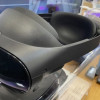Testing Intel’s 12th-gen Alder Lake laptop CPUs: Many cores make light work

We were impressed with Intel's top-tier 12th-generation desktop chips. Though still power-hungry compared to competing AMD Ryzen processors, their combination of big performance cores (P-cores) and clusters of small efficiency cores (E-cores) helped them shine under all kinds of workloads, including games that favor fewer, faster cores and video encoding and rendering tasks that benefit from every core you can throw at them.
The laptop versions of those chips, which Intel announced at CES earlier this month, don't have access to a desktop computer's huge power supply or beefy cooling systems. They also don't benefit from being compared to mediocre predecessors. 11th-generation Core desktop processors backported a new CPU architecture to Intel's decrepit 14nm manufacturing process with unimpressive results, while 11th-generation Core laptop chips benefitted from the newer 10nm process and correspondingly lower heat and power consumption. The 12th-generation chips use the same process, though it has been re-dubbed "Intel 7" to close the PR gap between Intel's 10nm process and TSMC's 7nm process.
The first Alder Lake laptop processor to find its way into our hands is the tippy-top-end Core i9-12900HK, the fastest of the bunch. In our testing, we tried to see whether the laptop version of Alder Lake strikes the same performance balance as the desktop version—fast cores when you need fast cores and lots of cores when you need lots of cores.









































































